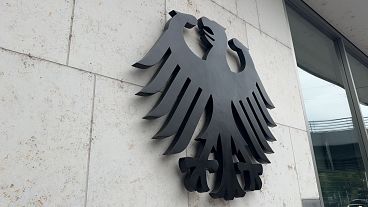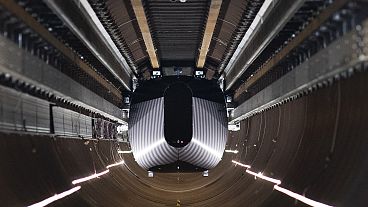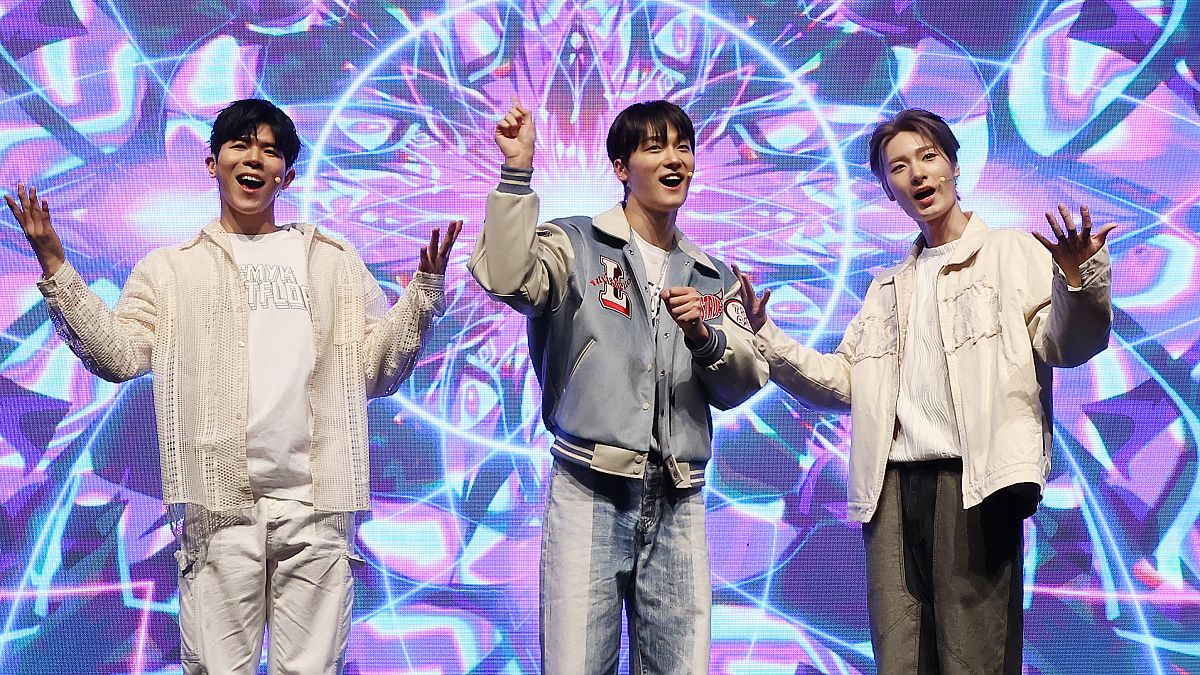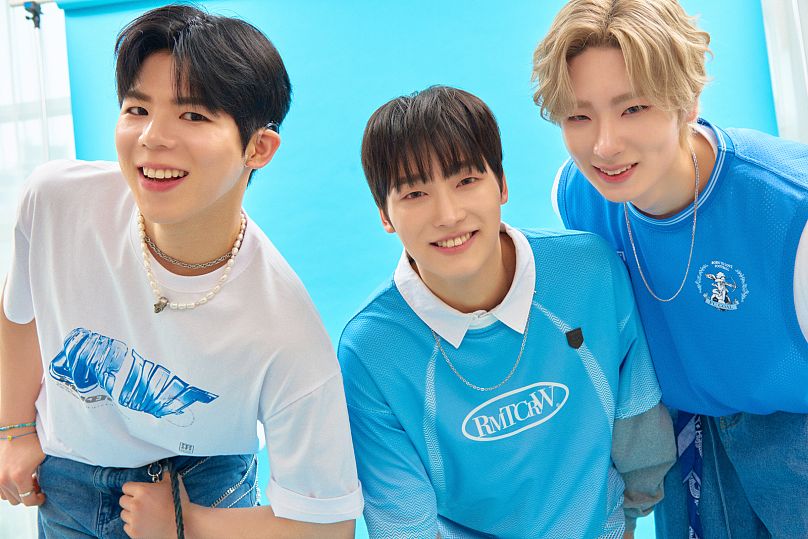In a world designed for the hearing, the first hard-of-hearing K-pop boy band’s debut has been made possible thanks to advanced technologies.
In the glittering world of K-pop, where synchronised dance routines and pitch-perfect harmonies reign supreme, a boy band composed entirely of hard-of-hearing members is breaking the mould.
Among Big Ocean's members, Jiseok was born with hearing loss, while Hyunjin and Chanyeon lost part of their hearing at ages three and 11, respectively.
Before training to become K-pop idols, the members of Big Ocean were on completely different paths: Jiseok was an alpine skier, Hyunjin was a YouTuber, and Chanyeon was an audiologist.
Yet, they all harboured dreams of becoming stars and defying the prejudice towards people with disabilities.
Their new band debuted on April 20 to coincide with South Korea’s Day of People with Disabilities.
“Our mission is not only for people with unique abilities. It’s for everyone facing their own challenges,” Hyunjin, Big Ocean’s main vocalist, told Euronews Next.
“We want you to know that no matter what you're going through, you are not alone,” Hyunjin added.
Need for visual cues
The path to stardom in K-pop is notoriously difficult, often demanding years of gruelling training. For Big Ocean, these challenges were magnified by a desire to change perceptions.
The band’s members and its management company, Parastar Entertainment, say technology played a significant role in helping Big Ocean become K-pop artists.
All three members of Big Ocean wear hearing aids, and two of them have had cochlear implant surgeries. Cochlear implants work by bypassing the damaged inner ear and directly stimulating the auditory nerve with electrical signals, allowing the brain to perceive sound, while hearing aids are wearable devices that amplify external sounds.
One of the challenges included synchronising their dance moves as each member uses different hearing aids.
“If they’d dance one-by-one, they were almost in perfection. But when they danced together, it was totally different,” Haley Cha, Parastar Entertainment’s CEO, told Euronews Next.
Out of frustration, Big Ocean’s dance trainer started clapping loudly to the beat, and Cha noticed that the members were more in sync.
“[We] later found out it was not because of the clap sound, but because of the clap visual. So we had a hint that they were feeling better with visual cues. That’s how we came up with a screen to give it the flashing light,” Cha said.
Since then, Big Ocean started practising choreography using vibration metronomes on smartwatches and flashlight metronomes on the screen.
“We used a visual and sensory metronome system because they couldn't hear the music perfectly. We made a flashing light so that they could see the beats in a visual way,” said Cha.
A debut made possible through AI and advanced technologies
For hard-of-hearing individuals, singing can present challenges in perceiving pitch and rhythm accurately.
To ensure that each member’s voice met industry standards, Big Ocean used voice conversion technology to modify and improve vocal performances in collaboration with Korean music production companies Muble and Samsong E&M.
“Since all the members of Big Ocean are deaf, it was physically difficult for them to sing with accurate pronunciation or pitch,” Hans Choo, Muble’s head producer, told Euronews Next. “We transformed the voices of the Big Ocean members into AI models, and then we used these models to infer voices that could capture their individual characteristics.”
Big Ocean’s first song was made by applying the AI models to a vocal guide recorded by Korean rapper Mac Curly.
According to Muble, its AI voice conversion service uses machine learning technology to convert or generate voices.
“By using this, it’s possible to either learn to replicate a specific person’s voice or create entirely new voices that have never been heard before,” said Choo.
“For Big Ocean, for example, we used AI to learn each member’s voice and then created certain sections they found difficult to sing themselves.”
According to Parastar Entertainment, it took almost three months to gather the talking, conversational, singing and even rap voices of Big Ocean members in both Korean and English to reach the desired result of singing for the first song, which was shortened to just several weeks for their later songs.
During two sessions at Muble’s recording studio, the band recorded around 500 takes to train high-quality AI models for each member. Typically, producing new albums can take up to 200 to 300 takes, according to Muble.
“For Big Ocean, the goal was to produce a natural and cohesive sound, so we didn’t rely solely on technology,” said Choo.
“There are many AI technologies available currently, but there are still significant limitations in making the sound natural solely by collecting [recorded vocal] data,” Hoseon Lee, founder of Samsong E&M and Muble, added. “This is particularly true for the Korean language, where it is extremely challenging and almost impossible.”
The music production company created separate models for different languages and various parts of the song to fine-tune the final products.
“When we listened to the completed version, it was incredibly moving on a personal level. We’ve heard that many people who listened to it also felt deeply touched and even cried,” said Choo.
Parastar’s Cha compares Big Ocean’s use of AI voice conversion to upgrading the sound of the song digitally, despite rising global concerns around job losses for voice actors and copyright problems linked to these technologies.
In May, Open AI’s ChatGPT voice mode faced controversy for sounding similar to actress Scarlett Johansson, for instance.
“Back in music history, when Digital Audio Workstation (DAW) was first introduced to replace manual process, it was also discussed in public whether it takes out the authenticity of the music,” Cha wrote in an email.
“As long as AI is not infringing any artist’s current rights, and (is) used in an organised system, I personally think it will become a new normal pretty soon,” she added.
She added that all parties taking part in the production are recognised for their role and compensated for it.
Experts believe emerging technologies like AI voice conversion will increase accessibility to music.
“If we consider music as a common language that can uplift and unite us, then the availability of tools like AI to artists of all identities can vastly expand the diversity of voices in music,” Rachel Alina, an assistant professor at the Department of Music Production and Engineering at Berklee College of Music, told Euronews Next.
“Big Ocean is a shining example of how technology can enable those who might have been sidelined in mainstream music-making processes to share their stories and talents with the world,” she said.
However, experts warn that while the technology’s future is exciting, it comes with important responsibilities, specifically concerning the consequence of unequal access.
“As these technologies become more widely accessible, the gap between those who have access to them, and those who do not have access to them, will rapidly widen,” Ben Camp, a songwriting professor at Berklee College of Music, told Euronews Next in an email. “It’s my hope that availability and accessibility is prioritised as much as development,” they added.
Alina noted that there’s also a risk that over-reliance on AI might lead to a loss of the “nuanced human touch” that makes music so emotionally powerful.
“But as we’ve seen with other technological advancements in all creative pursuits, these new tools will likely give rise to new skills and forms of expression,” she added. “It’s exciting to think about where this might lead, and ultimately, what resonates most with audiences will show us what works best.”
Embracing diversity in K-pop
From developing the band’s stage presence to providing sign language lessons, Parastar Entertainment says it tried not to overlook anything during preparation for Big Ocean’s debut.
“One of the anticipated challenges was adapting our training methods to accommodate each member’s unique needs,” said Cha.
“But what we didn’t see coming was the financial crisis behind the idol scene. Whatever we expected with the prepared budget, the expenses were bigger,” she added.
K-pop, a global phenomenon, has seen tremendous growth over the past decade. A report by Allied Market Research showed that the K-pop events market alone was valued at €7.4 billion in 2021 and is estimated to reach €18 billion by 2031.
In 2021, K-pop label HYBE, a management company behind the band BTS, acquired singer Justin Bieber’s management company Ithaca Holdings.
In an industry often criticised for its rigid standards and lack of diversity, Big Ocean is trying to reach a global audience.
The group has now established a total of 1.1 million followers across three different social media platforms, according to its management company.
“To be honest, the more the people are open to diversity and inclusion, the better reaction comes to Big Ocean,” said Cha. “For instance, in the United States or European countries where they have a very good, social perception of disability, they tend to be more passionate about Big Ocean. So, an even better market compared to the Korean market. We wanted to reach that area where we can be more welcomed.”
Big Ocean says they always incorporate sign language in their performance to make it easier for everyone to enjoy music. The band has released its first single ‘Glow’ performed in Korean sign language and its second ‘Blow’ in American sign language.
“The members themselves have (had) so many, hard times and various hardships, our songs and lyrics containing these ideas are more relatable to many people,” said Cha.
Big Ocean says they hope they can be accepted as a regular K-pop idol one day.
“I want to be acknowledged not only for our unique abilities but also for our talent and hard work, just like any other idol. And by achieving this, I think we can naturally break social prejudices and create great music together,” said Hyunjin.
“My biggest dream would be to perform in front of our fans with my own voice. The members and I are currently dedicating ourselves to a lot of vocal training, and it is our hope to show everyone our progress and improvement,” said Jiseok.
Big Ocean has recently released a new album named 'Slow' timed with the 2024 Paralympics.
For more on this story, watch the video in the media player above.
















